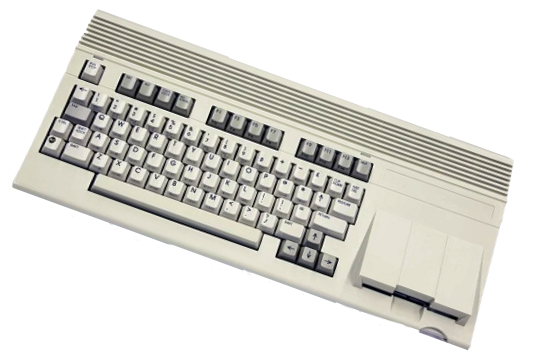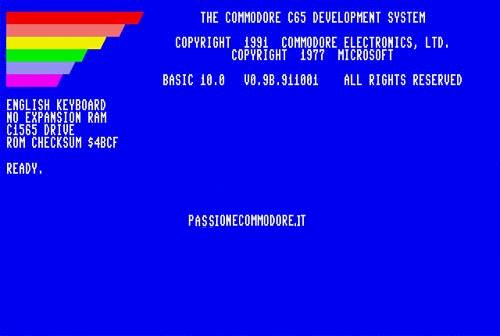Menu
Home Commodore Story Commodore PET Commodore VIC-20 Commodore MAX Machine Commodore 64 Commodore 16 Commodore 128 Commodore 65 Amiga 500 Amiga 600 Amiga 1200 C64 Repairs Datassette Maintenance Datassette Azimuth Calibration Amiga 500 Repairs Test Repairs C64 VIC20 Power Supplys Format Floppy Disk 720 Kb ATX Power Supply for Amiga 500 Substitute Amiga Floppy Drive with PC Floppy Drive Create Cassette for CBM64-128, Vic20 and CBM16 Trasfer PC-Amiga Files (Amiga Explorer) Trasfer PC-Amiga Files (ADF Sender Terminal) View Pictures and Images PC-C64 View Pictures and Images PC-Amiga Build Null-Modem Serial Cable Build Video Scart Cable C64, C128, Vic20 Build C64/C16 Joystick Adapter Aesthetic Restoration Adapter Emulators Online Commodore Emulators SD2IEC BASIC Commodore Collecting Retrogaming Other Vintage Computers New Unofficial Games
Access the Commodore 65 user manual


commodore 65
|
|
COMMODORE 65
Between 1990 and 1991 the prototype Commodore 65 (C64DX) was born, a prototype created by various designers including Fred Bowen (engineer from MOS Technology). The Commodore 65 is compatible with the Commodore 64, but with superior technical characteristics, starting from the CSG 4510 CPU with a frequency of 3.54 Mhz (against 1 Mhz of the C64). Even the graphics chip (VIC III) is clearly superior to its predecessor, with 4096 colors available, 256 of which on screen, at resolutions of 320×200×256, 640×200×256 and 640×400×16. The audio is managed by 2 SID CSG 8580 chips (double compared to the C64) and the RAM is equal to 128 K and, most importantly, expandable up to 8 MB.

The Commodore 65 is equipped with 2 Joystick/mouse ports, 1 serial port, 1 user port, reset button (very important and absent in the C64), RF video connector, 1 female 9-pin RGB video connector, 2 RCA audio ports (like for Amiga) and 1 RAM expansion port (Belly).
The CBM 65 screen shows the version of BASIC 10.0, the presence or absence of any memory expansion and of the floppy drive for 3½ disks.

8 years after the launch of the C64, the C65 was to be its successor. It must be said that after all these years the C64 still enjoyed a good number of sales, and a not negligible factor, we are in the middle of the Amiga era. For this reason it was designed to address that portion of users still tied to the Commodore 64 and who weren't willing to upgrade to more expensive 16-bit machines (Amiga). The project delay was the real problem. By now the Amiga was becoming the mass computer and the 8 bits (although the C65 was truly performing) were destined to become history already. This delay (and therefore the error) was also due to the fact that Commodore we wanted to continue to exploit the still high number of sales of the C64. It is clear that the release of the C65 would have led to a sharp drop in sales of its predecessor, but by now the market for 16-bit machines was taking over.
The Commodore 65 remained a prototype and was not commercially popular. The hardware features of this machine were truly remarkable for the time, making it very similar to an Amiga 500. Only in 1994, during the liquidation of Commodore Business Machines (CBM), some units were placed on the market. There is talk of about 2000 units sold at a cost of 1000 dollars. For this reason today the Commodore 65 is highly sought after from a collector's point of view, but now almost impossible to find. The value of a perfectly functional Commodore 65 today is around twenty thousand euros.
MEGA 65
Currently the Commodore 65 project has been taken up by some enthusiasts and renamed Mega 65 (Visit the Mega 65 official website to be able to buy it in pre-order). Unofficial (open source) project of a computer based on the Commodore 65, which aims to improve its original performance with newer hardware components and more memory.
TECHNICAL CHARACTERISTICS OF THE MEGA 65:
The Mega 65 uses a Field-Programmable Gate Array (FPGA) processor to emulate the original MOS Technology 6510 processor of the Commodore 65, but with a much higher clock speed. The RAM memory is 1 GB, compared to 64 KB of the original Commodore 65.
The Mega 65 has an FPGA sound card that emulates the original SID 8580 card of the Commodore 65, but with a improved sound quality. An FPGA graphics card that emulates the Commodore 65 graphics mode, but with higher resolution and color depth. The Mega 65 is also equipped with an Ethernet port and a USB port, which allow you to connect the computer to a network and to external devices such as flash drives USB and external hard drives.
As mentioned above Mega 65 is an open source project, so you can buy a kit to build it yourself or buy it already assembled from some resellers. Mega 65 IS NOT AN OFFICIAL PRODUCT of Commodore International and is not supported by them.
Commodore 65 Emulator
If you are looking for an emulator for Commodore 65 you can download it from the official web page of the site Hi65 Commodore 65 Emulator.
